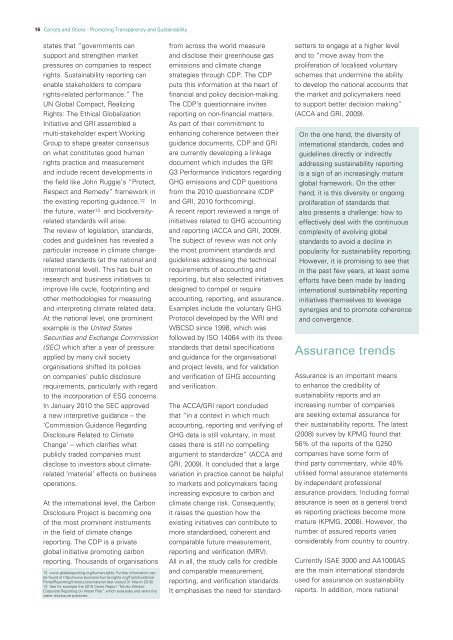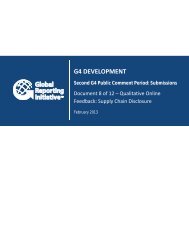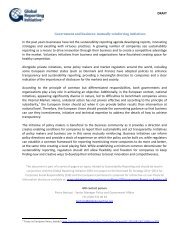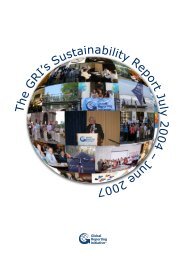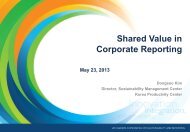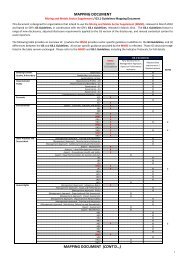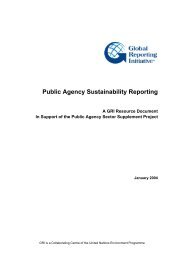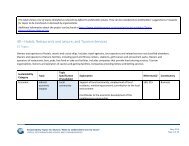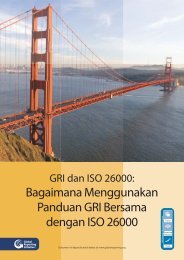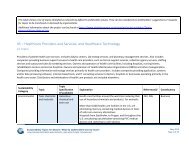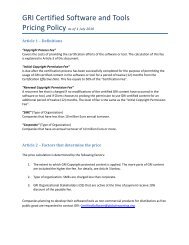CARROTS AND STICKS – PROMOTING ... - Global Reporting Initiative
CARROTS AND STICKS – PROMOTING ... - Global Reporting Initiative
CARROTS AND STICKS – PROMOTING ... - Global Reporting Initiative
Create successful ePaper yourself
Turn your PDF publications into a flip-book with our unique Google optimized e-Paper software.
16 Carrots and Sticks - Promoting Transparency and Sustainability<br />
states that “governments can<br />
support and strengthen market<br />
pressures on companies to respect<br />
rights. Sustainability reporting can<br />
enable stakeholders to compare<br />
rights-related performance.” The<br />
UN <strong>Global</strong> Compact, Realizing<br />
Rights: The Ethical <strong>Global</strong>ization<br />
<strong>Initiative</strong> and GRI assembled a<br />
multi-stakeholder expert Working<br />
Group to shape greater consensus<br />
on what constitutes good human<br />
rights practice and measurement<br />
and include recent developments in<br />
the field like John Ruggie’s “Protect,<br />
Respect and Remedy” framework in<br />
the existing reporting guidance. 12 In<br />
the future, water 13 and biodiversityrelated<br />
standards will arise.<br />
The review of legislation, standards,<br />
codes and guidelines has revealed a<br />
particular increase in climate changerelated<br />
standards (at the national and<br />
international level). This has built on<br />
research and business initiatives to<br />
improve life cycle, footprinting and<br />
other methodologies for measuring<br />
and interpreting climate related data.<br />
At the national level, one prominent<br />
example is the United States<br />
Securities and Exchange Commission<br />
(SEC) which after a year of pressure<br />
applied by many civil society<br />
organisations shifted its policies<br />
on companies’ public disclosure<br />
requirements, particularly with regard<br />
to the incorporation of ESG concerns.<br />
In January 2010 the SEC approved<br />
a new interpretive guidance <strong>–</strong> the<br />
‘Commission Guidance Regarding<br />
Disclosure Related to Climate<br />
Change’ <strong>–</strong> which clarifies what<br />
publicly traded companies must<br />
disclose to investors about climaterelated<br />
‘material’ effects on business<br />
operations.<br />
At the international level, the Carbon<br />
Disclosure Project is becoming one<br />
of the most prominent instruments<br />
in the field of climate change<br />
reporting. The CDP is a private<br />
global initiative promoting carbon<br />
reporting. Thousands of organisations<br />
12 www.globalreporting.org/humanrights. Further information can<br />
be found at http://www.business-humanrights.org/ToolsGuidance-<br />
Portal/<strong>Reporting</strong>/Introductorymaterial (last visited 31 March 2010)<br />
13 See for example the 2010 Ceres Report “Murky Waters:<br />
Corporate <strong>Reporting</strong> on Water Risk” which evaluates and ranks the<br />
water disclosure practices.<br />
from across the world measure<br />
and disclose their greenhouse gas<br />
emissions and climate change<br />
strategies through CDP. The CDP<br />
puts this information at the heart of<br />
financial and policy decision-making.<br />
The CDP’s questionnaire invites<br />
reporting on non-financial matters.<br />
As part of their commitment to<br />
enhancing coherence between their<br />
guidance documents, CDP and GRI<br />
are currently developing a linkage<br />
document which includes the GRI<br />
G3 Performance Indicators regarding<br />
GHG emissions and CDP questions<br />
from the 2010 questionnaire (CDP<br />
and GRI, 2010 forthcoming).<br />
A recent report reviewed a range of<br />
initiatives related to GHG accounting<br />
and reporting (ACCA and GRI, 2009).<br />
The subject of review was not only<br />
the most prominent standards and<br />
guidelines addressing the technical<br />
requirements of accounting and<br />
reporting, but also selected initiatives<br />
designed to compel or require<br />
accounting, reporting, and assurance.<br />
Examples include the voluntary GHG<br />
Protocol developed by the WRI and<br />
WBCSD since 1998, which was<br />
followed by ISO 14064 with its three<br />
standards that detail specifications<br />
and guidance for the organisational<br />
and project levels, and for validation<br />
and verification of GHG accounting<br />
and verification.<br />
The ACCA/GRI report concluded<br />
that “in a context in which much<br />
accounting, reporting and verifying of<br />
GHG data is still voluntary, in most<br />
cases there is still no compelling<br />
argument to standardize” (ACCA and<br />
GRI, 2009). It concluded that a large<br />
variation in practice cannot be helpful<br />
to markets and policymakers facing<br />
increasing exposure to carbon and<br />
climate change risk. Consequently,<br />
it raises the question how the<br />
existing initiatives can contribute to<br />
more standardised, coherent and<br />
comparable future measurement,<br />
reporting and verification (MRV).<br />
All in all, the study calls for credible<br />
and comparable measurement,<br />
reporting, and verification standards.<br />
It emphasises the need for standard-<br />
setters to engage at a higher level<br />
and to “move away from the<br />
proliferation of localised voluntary<br />
schemes that undermine the ability<br />
to develop the national accounts that<br />
the market and policymakers need<br />
to support better decision making”<br />
(ACCA and GRI, 2009).<br />
On the one hand, the diversity of<br />
international standards, codes and<br />
guidelines directly or indirectly<br />
addressing sustainability reporting<br />
is a sign of an increasingly mature<br />
global framework. On the other<br />
hand, it is this diversity or ongoing<br />
proliferation of standards that<br />
also presents a challenge: how to<br />
effectively deal with the continuous<br />
complexity of evolving global<br />
standards to avoid a decline in<br />
popularity for sustainability reporting.<br />
However, it is promising to see that<br />
in the past few years, at least some<br />
efforts have been made by leading<br />
international sustainability reporting<br />
initiatives themselves to leverage<br />
synergies and to promote coherence<br />
and convergence.<br />
Assurance trends<br />
Assurance is an important means<br />
to enhance the credibility of<br />
sustainability reports and an<br />
increasing number of companies<br />
are seeking external assurance for<br />
their sustainability reports. The latest<br />
(2008) survey by KPMG found that<br />
56% of the reports of the G250<br />
companies have some form of<br />
third party commentary, while 40%<br />
utilised formal assurance statements<br />
by independent professional<br />
assurance providers. Including formal<br />
assurance is seen as a general trend<br />
as reporting practices become more<br />
mature (KPMG, 2008). However, the<br />
number of assured reports varies<br />
considerably from country to country.<br />
Currently ISAE 3000 and AA1000AS<br />
are the main international standards<br />
used for assurance on sustainability<br />
reports. In addition, more national


